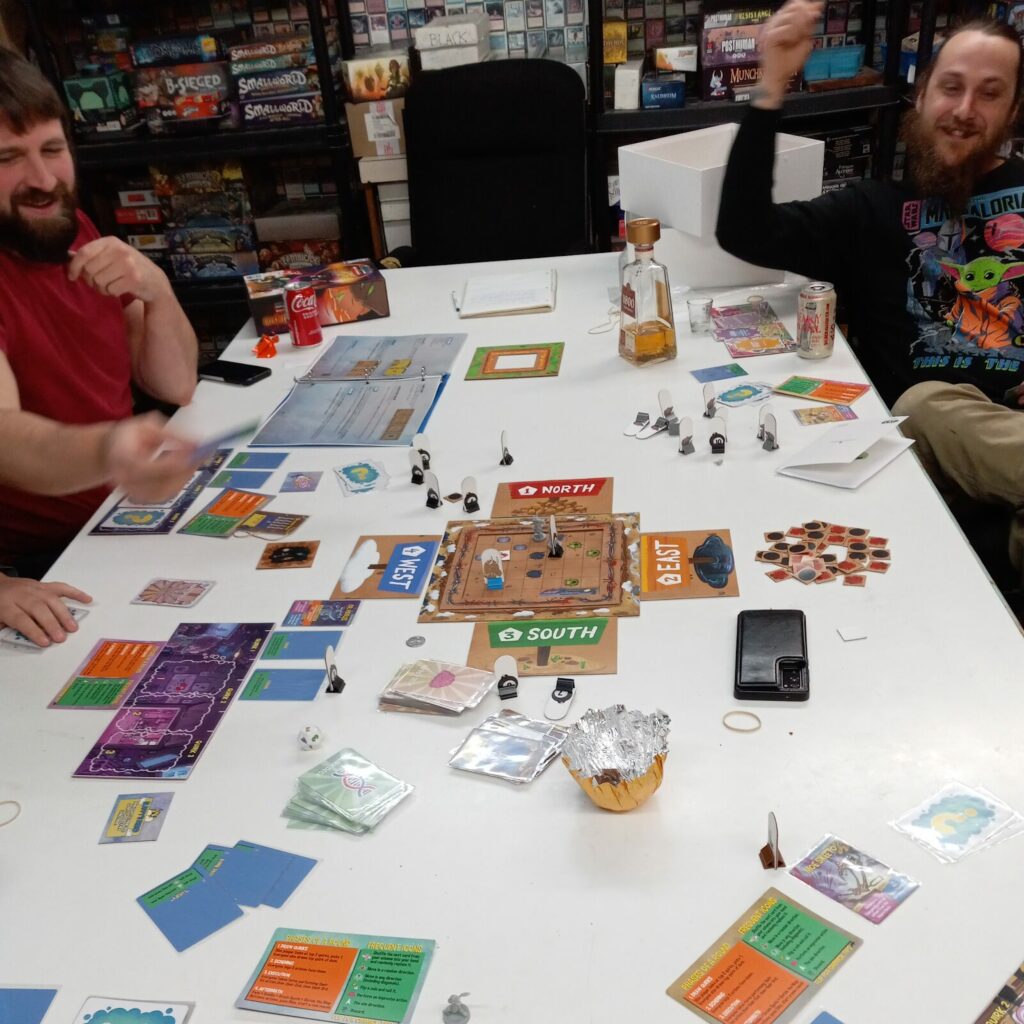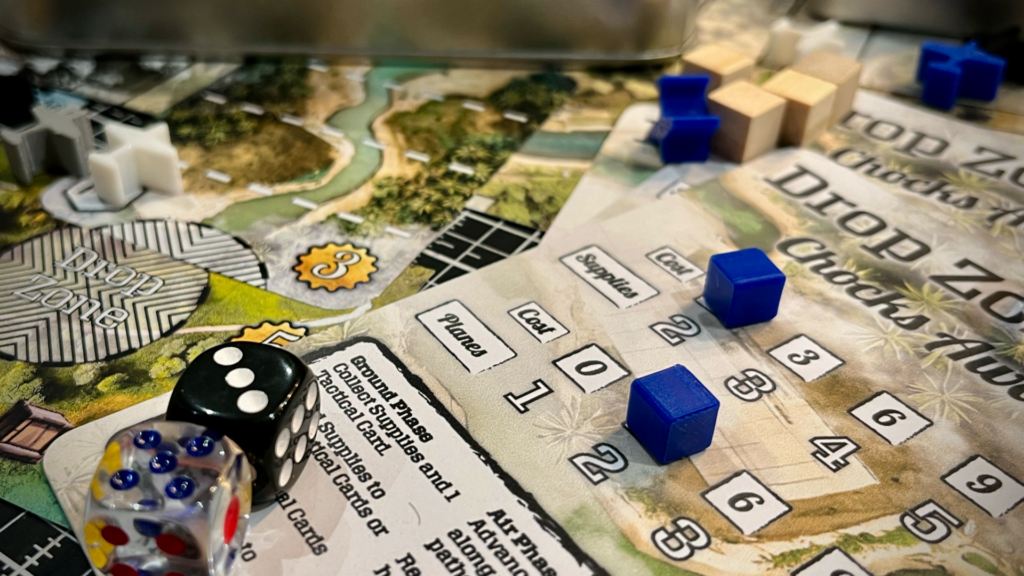
As I explore the indie publishing space more and more, I’m looking to bring more designers to the blog to share their experiences of everything games design. In this post, I chat to Chris who is currently (as of writing) mid kickstarter campaign – you can find the campaign here, and can find Chris on Instagram here! Enjoy the post.
Joe: heya, I’m really looking forward to this chat, can you start by introducing yourself and tell us a bit about you and your background and what brought you to games?
Chris: Hey Joe! I’m Chris Cooke, and I’m actually a full-time video game designer based out of Edmonton, Canada. Since I was really little I’ve always loved playing games, so when I got old enough for people to start asking what I wanted to do when I grew up, I just said “make video games” because they were my favourite thing. Once I was around 10-13, I started seriously thinking about that question and realised that my answer hadn’t really changed. I haven’t wavered in that since, and I’m glad, because I genuinely love making games. Somewhere around high school I got really into tabletop games of all kinds with a bunch of friends at a local gaming club in my hometown, from Magic the Gathering and Pathfinder to Betrayal at House on the Hill and even war games like Warmachine. Those experiences eventually led to me starting my own board game project. Over the course of 6 years, that game turned into UNSCREWED as it is today!
Joe: That’s ace – can you tell me a little bit about your current game Unscrewed? What makes it stand out from the croud?
Chris: UNSCREWED is a chaotic, 90s cartoon inspired battle royale game. Heavily influenced by shows like Ren & Stimpy, Courage the Cowardly Dog, and other cartoons from that era. It’s a programmed action game, which is normally seen in robot themed games, but I’ve always thought stubbornly sticking to the same plan regardless of what new information you receive seemed very Wile E. Coyote, so it was a fun mix to play with. I think the unique part of unscrewed is the core experience it’s trying to present – the whole thing is about seeing what you wanted to do go horribly wrong, and laughing with your friends about it. Normally, “you didn’t do what you wanted” is pretty unfulfilling in games, and a whole game about it can seem pretty unappealing, so it was definitely a challenge to my usual game design sensibilities. I think it’s a strong experience though, and one a lot of other games don’t offer. A lot of our effort has been invested in making getting on board with that experience easier for players – from the art making it clear what the game is gonna be like, to all the little things we did to make sure games were fast and mostly non-malicious.
Joe: designing games is always a journey for the creator – how long has this journey been for you, and looking back on everything pre-Kickstarter what have been the memorable points?
Chris: UNSCREWED has been in development for about 6 years now. At first it was infrequent – I’d maybe spend a weekend every other month working on a prototype, but about 4 years ago I started taking it more seriously and have worked on it every day since.
A notable memory is from when I went to Origins game fair a few years back and was HORRIBLY under-prepared. It was my first “big” convention, I didn’t have a booth or a table, and I’d done a terrible job of budgeting for it. I spent the weekend set up on a table in the hallway calling passersby over to try it out while sleep deprived and hungry. It actually went really well, until partway through the second day when the organisers caught on and told me I couldn’t demo in the hall. I said fair enough and went to find a different spot in the same hall!

Another big lesson was a couple years in, at the height of the pandemic lockdown, I was desperately trying to find play testers so I could keep iterating, and I turned to some playtesting services which charged a fee for their time. I had mixed results with that overall, but one in particular stands out as they actually sent me a refund partway through because they felt the game was too early (and rough) for them to feel okay taking my money.
It was hard to hear, but I really appreciated the honesty. I think they had a lot of fundamental issues with the game. The game hasn’t actually changed too fundamentally since then. The whole thing helped me learn the lesson that not every game is going to be for every person, and that’s a good thing.
Not every game is going to be for every person, and that’s a good thing.
Joe: Those are some big and hard lessons to hear – what’s your strategy for picking yourself up from those moments and moving forward. How do you decide what to take from those experiences and what to leave behind?
Chris: For the refund example, I actually took a 30 day break from UNSCREWED and made a prototype for a different, smaller game. I found that the time spent designing something else really helped me come back to UNSCREWED with fresh eyes and think about what my game was about and what I wanted to do about the feedback. To me, it just seemed like they were fundamentally opposed to the experience the game was trying to create, and it didn’t feel right to try to change the game for people who weren’t really into it anyway.
Now, if I’d gotten that feedback from a lot more people, I’d probably re-evaluate, I guess it’s an endless struggle between “make something with a vision” and “make sure enough people actually want to play it”.
I think the most important thing you can do to decide what you should take and what you should leave is to get to the root of the issue. By digging into people’s feedback with some targeted questions, it gets a lot easier to find a direction for yourself. Someone might say something like “I wish the game lasted longer”, but when you dig into that, maybe you find out that really what they didn’t enjoy was that they lost a cool ability early on and wanted more time to get it back. If you just took “I wish it was longer” at face value, you could make a pretty big change to the game without actually solving what the person didn’t like.
By digging into people’s feedback with some targeted questions, it gets a lot easier to find a direction for yourself.
Joe: Sometimes a break is definitely what you need – and it looks like it worked really well for your game in the end. Let’s move to your experience of running a Kickstarter for the first time – what have been the highs and the lows?
Chris: The high was definitely funding in our first four days. In the years leading up to launch, I’ve spent a considerable amount of time worrying that we wouldn’t fund at all, so seeing a big enough show of support to not only fund but to do so quickly has been a really incredible thing.
The low is the dreaded lull in the middle of the campaign that plagues a lot of Kickstarter campaigns. You want so badly to have exciting things to share to keep the momentum going, but sometimes there’s just nothing to say, so you find yourself writing updates that are pretty similar to what you said last time but trying to come up with enough new info to justify the post, and it’s all super weird. Then there’s the odd person who cancels their pledge, and despite knowing that it could be for a myriad of reasons, there’s a little pang of sadness mixed up in there – a “what did I do wrong?” kind of thing. I’ve done my best to reach out to the few folks who have cancelled their pledges to ask how I can do better next time, and that’s helped put it into perspective for sure. Overall though, I’d say the highs far outweigh the lows. On my best days, I can’t believe it’s happened; ffter all this time, the game gets to exist, and that’s really awesome.
Joe: sounds like a rollercoaster! What’s been your advertisement strategy throughout the campaign? Where have your ads gone, who have you targeted? And how have you been adapting your approach based on ad metrics?
Chris: This is a great question that I wish I could answer thoroughly, but to be honest, I realised really early on that advertising is one of my many deficiencies, so I ended up partnering with an agency that has experience advertising for board game Kickstarters. I went with CrowdfundingNerds who specifically work with Facebook and Instagram for their ads. They handled setting up our most recent landing page, running ads that funnel folks into that, and then retargeting people who’ve seen previous ads to try to convert them to backers.
In terms of non-ad based marketing, I’ve still done a lot myself to try to spread the word. Going back as far as probably 3 years now, I’ve reached out to just about every local board game store in my area and done multiple demos at most of them. I’ve attended all the local cons (plus some non-local ones, budget permitting), posted weekly on social media pages for quite a while, and even sent out a monthly newsletter to the folks on my mailing list. It’s a whole lot of work for what starts as a very small payoff, but I see a night and day difference between the lasting interest of folks who’ve met me, played the game, and heard the story of it getting made and the folks who just clicked on an ad.
Joe: The honesty is appreciated – sometimes you’ve just got to outsource to experts! Final question – for other designers about to embark on a crowdfunder – what is your core advice, the sort of thing people really need to focus on!
Chris: Ok, here goes…
- Don’t launch too early. This is classic and you read about it everywhere, but it’s with good reason. Kickstarter really doesn’t reward projects that launch blind, and the more people you have ready to back on day one the better. Taking the time you need to show it to people and build up a following is huge. Demos at local stores and showing it off at conventions is what got me the most traction, but don’t be afraid to show it to people online, either!
- Do your homework. There are so many things that can go wrong when fulfilling a Kickstarter campaign, and thankfully lots of people have done the learning for us. Study up on everything you can and try to go into your campaign with a lot of the essentials already figured out. Things like: how much does a minimum order from the manufacturer cost? How much will shipping them cost? Where am I going to ship them to? What if we get more backers than I expect? That’s all stuff you can figure out (roughly, anyway) before the campaign starts, and you should! Once you’re live and the time beyond, you have a lot less time to take it slow and do things right, so the more you can set yourself up for success ahead of time, the better.
- Make sure the game is fun. This sounds like a no-brainer, but it can be easy to think something’s ready earlier than it is. It’s critical that you get as many different people as possible to play your game, from a variety of different gaming backgrounds. Not just your friends or family, either! Get strangers to play, too, and make sure you thoroughly test your rulebook – I had great results running tests where I silently observed groups teach themselves the rules. It can be hard on your ego, but the only way to make something fun is to push through that and make smart decisions in how you iterate.
But those are just some thoughts from someone who’s still only part way through their first time doing this. I’m excited to see what other lessons I’ll get to learn!
Thank you to Chris for his time and insight in this blog post – if you’re reading before 25 July 2025, you still have time to back the kickstarter campaign for his game, UNSCREWED!


